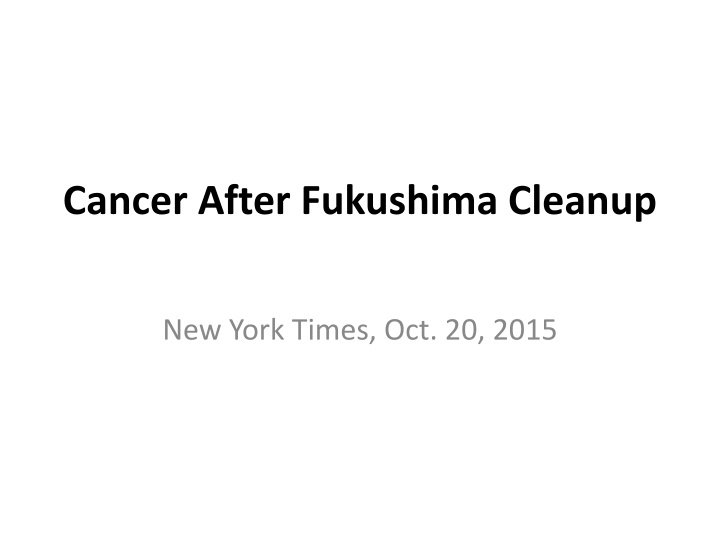
Cancer Risk at Fukushima Cleanup Site Raises Concerns
"Discover the ongoing challenges faced by workers at the Fukushima Daiichi nuclear power plant cleanup site, where concerns about radiation exposure and cancer risks have prompted workers to seek compensation and raises national debate. Learn more about the complex issues surrounding the aftermath of the Fukushima disaster." (288 characters)
Uploaded on | 0 Views
Download Presentation

Please find below an Image/Link to download the presentation.
The content on the website is provided AS IS for your information and personal use only. It may not be sold, licensed, or shared on other websites without obtaining consent from the author. If you encounter any issues during the download, it is possible that the publisher has removed the file from their server.
You are allowed to download the files provided on this website for personal or commercial use, subject to the condition that they are used lawfully. All files are the property of their respective owners.
The content on the website is provided AS IS for your information and personal use only. It may not be sold, licensed, or shared on other websites without obtaining consent from the author.
E N D
Presentation Transcript
Cancer After Fukushima Cleanup New York Times, Oct. 20, 2015
TOKYO A man who developed leukemia after working on a cleanup crew at the ruined Fukushima Daiichi nuclear power plant has been awarded workers compensation by the Japanese government, in what amounts to the first official acknowledgment that exposure to radiation at the disaster site may have caused cancer. The Ministry of Health, Labor and Welfare said on Tuesday that the man, whom it did not identify by name, worked between October 2012 and December 2013 installing protective covers over damaged reactor buildings at the site.
More than 40,000 workers have participated in the vast and laborious cleanup effort at Fukushima Daiichi since the plant was struck four and a half years ago by a tsunami, leading to multiple reactor meltdowns and blanketing the area with toxic debris. A number of those workers have since been found to have cancer and are seeking compensation from public insurance programs or the plant s owner, the Tokyo Electric Power Company, known as Tepco.
Their claims are both politically and medically fraught. Pinpointing the cause of any individual cancer is usually impossible and, with so many workers involved, some cases would inevitably arise regardless of radiation exposure. About one in 150 Japanese is diagnosed with cancer each year, according to the country s National Cancer Center. The disease is by far the leading cause of death in Japan.
Questions about the Fukushima accidents health effects have fueled a polarizing national debate. About 80,000 former residents remain displaced from the vicinity of the plant, and although the government is gradually rolling back the evacuation zone and spending $10 billion to scrape up contaminated soil, many say they do not want to return. Radiation levels are well below what most scientists say are dangerous, but they are still measurably higher than they were before the disaster a confounding signal for people making consequential decisions about their lives.
Plant workers face a different magnitude of risk. Tepco has been criticized for the sometimes sloppy training and protection it has offered cleanup workers at Fukushima, many of whom are unskilled and hired through arm s-length subcontractors and labor brokers. A government examination of the utility s safety practices in 2013 found it had underreported the radiation exposure of a third of the workers whose records were reviewed by inspectors.
Does it surprise you that Tepco has been accused of under reporting worker exposure? A. Yes B. No C. Incomplete information
